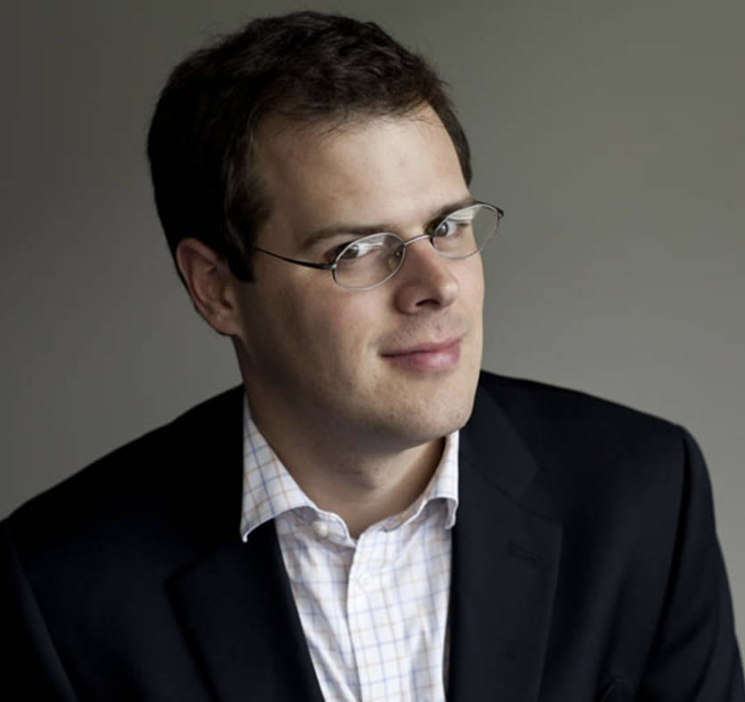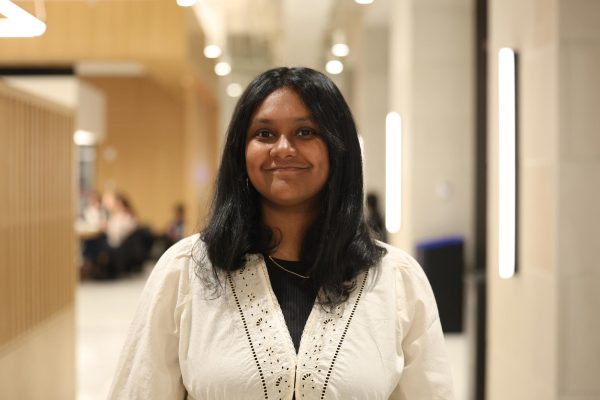Scott Detrow, FCRH ’07, might sit in a swivel desk chair in Washington D.C., but he’s caught in the orbit of a dozen stories, each one a different thread in the cross-country coverage brought to Americans on “All Things Considered,” National Public Radio’s (NPR) flagship news show where he works as a weekend host.
Within a couple of hours of an internal NPR morning news meeting, Detrow gets to work crafting his 60-minute episode full of pertinent news and wide-ranging features.
“There’s a different responsibility when you’re doing broadcast news,” Detrow said on Zoom from his office in D.C. “That’s often the first entry point people have into what’s going on.”
On his itinerary is an interview with political writer Bob Woodward and a trip to speak with North Carolina voters ahead of the 2024 presidential election. Just weeks ago, Detrow was in New York City interviewing Pulitzer Prize-winning journalist Robert Caro and spoke to two astronauts heading to previously untraveled extents in the Milky Way.
This year will mark his 10th year working at NPR and his first at “All Things Considered.” For over 15 years, he has been a professional journalist in the public radio system, covering politics, energy policy and local issues in reporting broadcasts across the nation. He also formerly served as NPR’s White House correspondent.
Born and raised in New Jersey, Detrow attended Jesuit high school at St. Peter’s Preparatory School on the Hudson River, right across from New York City. At 15, he moved to Wisconsin — a pitstop in the Midwest — before returning to the East Coast as a newly minted Fordham University Ram. One of his first experiences in journalism was writing for The Fordham Ram.
“I wrote a profile for the Ram of Sal at Pugsley’s and I thought ‘what an original angle!’ but people write that story every two years,” he said. “But then he was nice to me for the rest of my time at college.”
At Fordham, Detrow also began his career in public radio at WFUV where he volunteered as a news reporter. He reported under the guidance of Julianne Welby, the news director at the time.
“He stood out as an ambitious journalist from the start (along with quite a few other WFUV students in those days!). He wanted to cover serious news, including election coverage, perhaps because he was a Poli Sci major.” noted Welby. “He set a high bar for pursuing and executing professional journalism at WFUV for his peers at the time and future students who worked there.”
Rachel Lushinsky, currently a newscast producer at NPR, worked alongside Detrow in the WFUV newsroom when they were both undergraduates at Fordham.
“I remember him being such a natural on-air talent and very confident — so much so that I remember Scott filling in for the DJs themselves,” Lushinsky said. “It was above and beyond the normal student work. They would have summer vacation and he was hosting the whole entire show.”
At WFUV, Detrow reported and produced “Treating the Rainbow Nation” — an hour-long documentary on the public health AIDS crisis in South Africa. Detrow, then a rising senior, spent five weeks on the ground, conducting international public health reporting nearly 8,000 miles away from Fordham’s Rose Hill campus.
“I remember renting a car, driving around South Africa, forgetting at moments that they drive on the traditionally British side of the road and veering the car at the last minute,” he said.
Welby stated that Detrow took initiative in coordinating and producing the project.
“He had to put together a lot of plans in advance to do recorded interviews with folks and I recall he also did a lot of recording on the fly while he was there. When he returned, we worked together over Pro Tools to put together his documentary on WFUV,” said Welby.
Five weeks on the ground translated to many more in the newsroom, where Detrow furiously transcribed every word of every interview before cutting his story. His special was aired on WFUV’s “Cityscapes” and on San Francisco public radio station KQED.
Detrow recalled that the project was not without its difficulties. It was a new experience in international public health reporting and deeply sensitive coverage — a radically different flavor for a 20-year-old well-versed in WFUV’s citywide programming.
“Interviewing people who were in the process of dying and doctors who were in that setting — I remember having a really hard time,” Detrow said. “I don’t want to ask questions that are too intrusive. I feel like I shouldn’t be here as a reporter.”
Nevertheless, Detrow says that “Treating the Rainbow Nation” was a formative experience in high-stakes journalism — and one that he referred back to while interviewing Ukrainian civilians after the Russian invasion in 2022.
“I was directly thinking about that experience as a college student as I was pushing myself to ask follow-up questions of this woman whose sister and nephew were buried somewhere in the rubble that we were looking at,” Detrow explained. “Sitting there, I was like, ‘She wants to tell her story. She’s telling her stories to the world through this interview. It’s okay to be here asking this person these questions… That was something I started to learn 20 years earlier, doing that [South Africa] project.”
After WFUV, Detrow worked at NPR-member stations KQED in California and WITF in Pennsylvania — where he met his wife. When he first arrived at NPR in 2015, Detrow covered the White House, Congress and national politics for eight years. However, reporting has put him face-to-face with voters during periods of intense national uncertainty.
“When you’re talking about partisan stuff, you’re talking to people deep in these worldviews,” he said. “I remember walking around Trump rallies talking to QAnon people with QAnon paraphernalia and I asked, ‘How did you get here, and why is this something you’re building your life around? I really want to know.’”
At “All Things Considered,” Detrow hosts a wide range of coverage that runs the gamut. In addition to interviewing NPR correspondents on their reporting across the country, he has longer conversations with artists, writers and filmmakers. In the last few months, he’s spoken to Lael Wilcox, the fastest woman to ride around the world, and John Sterling, the soon-to-retire Yankees announcer.
It’s interviewing and coverage that’s much different than the political reporting he conducted previously.
“You’re thinking about a dozen topics at a time,” Detrow said. “The way you’re the host in an interview — trying to get information but also move the conversation along — it’s a totally different interview style… It’s something I’ve worked hard at over the last year.”
These days, Detrow spends time chasing his kids, aged two and six, with his wife — an experience he describes as a “constant state of motion.” He enjoys hiking and running in D.C. and listening to his favorite podcast, “Conan O’Brien Needs a Friend.”
Recently, Detrow reached another important milestone: his 40th birthday.
“I just turned 40, and somebody made a passing comment at work that day — ‘What was your 30th birthday like?’” Detrow said. “At 30, I was actually 100% sure I would never get to NPR and that it was a dead end and that it was never going to work out.”
It did work out, but it took time for Detrow to find a position with NPR.
“I applied to NPR so many times and never got the job,” recalled Detrow. “We were in California, and my wife and I knew we wanted to book it back to D.C.… I remember going for these long walks with our dog figuring out: how am I going to get a job in D.C.? What do I even do if it’s not going to work out at NPR, the place I’ve been trying to get to for a decade?”
Ultimately, Detrow said that the wait was worth it.
“Within a year of being at D.C., I was glad that six different NPR jobs hadn’t worked out because the one they brought me on for was the best fit of all of them,” he said. “There’s a lot of uncertainty when you’re a reporter at a local station. You have no idea if people are noticing your work or not and you just have to keep doing it and keep trying.”
As the anniversaries of a decade at NPR and a year at “All Things Considered” approach, Detrow said he has no plans to go anywhere anytime soon. He’s still awash with stories, interviews and people, weaving the multiplicities of the American voice into 60-minute episodes for the public.
“There’s so many days where you come to work expecting one thing and something wildly different happens, whether that’s an assassination attempt or less pressing news,” Detrow said. “The entire show could be totally rejiggered minutes before you air… That’s what drew me to the news. You don’t know what you’re going to do each day. It’s always different and you’re always learning something. That’s been a constant from my first day at WFUV until now.”









































































































































































































